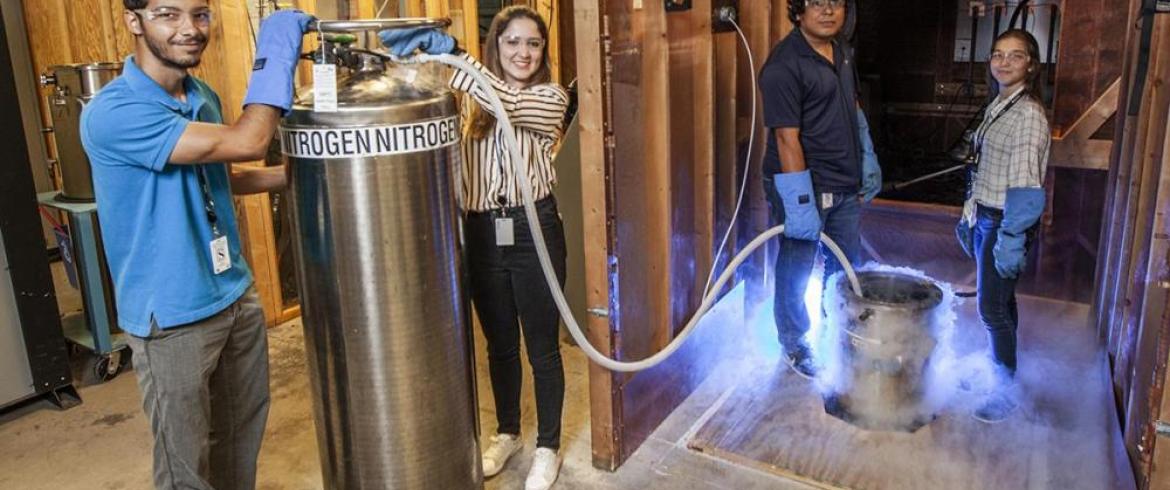
Herbert Lopez, Ana De Leon, Paola Chavez and Austin Rodriguez in the CAPS laboratory
Each weekday, FAMU-FSU College of Engineering undergraduates Herbert Lopez, Ana De Leon, Paola Chavez and Austin Rodriguez collaborate at the Center for Advanced Power Systems (CAPS) research facility to create a novel medium voltage cable that aims to have reduced reactive power than the ones currently used throughout the continental U.S. If they are successful, the cable could pave the way for improved power transmission efficiency on electric grids across the nation.
“Twenty years from now, entire dynasties may be using [the cable],” predicts Lopez, a senior electrical engineering student from Choluteca, Honduras.
Lopez, De Leon, Chavez and Rodriguez are transfer students from Florida State University's Republic of Panama campus, are working throughout the summer in the high voltage laboratory of CAPS, a research center affiliated FAMU-FSU College of Engineering. Their research focuses on developing gas-insulated medium-voltage cables using a more environmentally-friendly gas than what is currently available. As part of this research the group will focus on the environmental, manufacturing, electrical and economic considerations that go into designing the cables.
The group met as classmates at FSU Panama and have transferred to the main engineering campus in Tallahassee. They are working together to reach an ambitious milestone before the summer ends.
They were awarded a 2019 IDEA Grant by Florida State University’s Center for Undergraduate Research and Academic Engagement. IDEA Grants are given to subsidize students’ novel ideas and creative endeavors, ranging from artistic projects to solving practical, real-world problems. The $4,000 from the 2019 Steve Madden Undergraduate Research Award, a grant specified to fund STEM projects, helps cover the costs of their project. IDEA Grant projects are estimated to last eight to 12 weeks.
In order to create and test their prototype cable, the group must use skills from multiple engineering fields—making it a true interdisciplinary project. One of the key roles Chavez and Rodriguez – the two chemical engineering majors of the group—are focusing on potential gases which could be utilized as part of the insulation of the cable. De Leon, studying industrial engineering, is understanding how the cable can be manufactured in a continuous process.
While working at CAPS, the undergraduates are supervised by Peter Cheetham, Ph.D., research faculty at the facility. Under his management, the students test and measure their prototype using the lab’s high-voltage equipment. Cheetham said this familiarizes students with realistic engineering work.
“The whole idea of doing this undergraduate research is to expose students to the more practical problems and real-world constraints that they’ll see as engineers,” said Cheetham. “They also learn how to work as part of a research team and develop critical thinking skills as they solve the problems which inherently arise as part of any research.”
CAPS specializes in power cables and has created technology used for U.S. Naval applications. Last year the lab’s facilities were used to demonstrate a superconducting power cable that could be used to fuel power grids and generate power for all-electric ships.
At the unique facility, the students are also working on other research projects, including helium gas-cooled superconducting power cables that operate at cryogenic temperatures.
“The superconducting power cables we are currently developing utilize a similar design principle to the conventional cables the students are working on as part of their project,” Cheetham said.
Exposing the students to this additional work allows them to better understand the design constraints of their project and work on developing the optimal solution.
The culmination of the group’s research will be presented at the annual FSU President’s Showcase of Undergraduate Research Excellence in September 2019.
